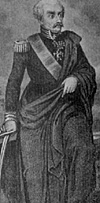 Field Marshal and Prince of Wahlstadt (1742-1819)
Field Marshal and Prince of Wahlstadt (1742-1819)
Famous for his last-minute arrival at Waterloo in 1815, which saved the Anglo-Allied army and helped Wellington defeat Napoleon, Blucher epitomizes for many Prussia's dogged determination to recover from the humiliating defeat by Napoleon's Grande Armee at Jena-Auerstadt in 1806 and to avenge itself against Napoleonic domination.
Blucher enlisted in Swedish service at age 14, then transferred to serve under Frederick the Great after being captured in 1760. Failing to find promotion, he resigned in 1773 to become a farmer, but arranged his recall before the eruption of the French Revolutionary Wars. Back in command of a Hussar regiment he distinguished himself early, rising to major general in 1794 and lieutenant general by 1801.
A bitter foe of France, he supported war in 1806 only to find himself vigorously leading the rear-guard on the retreat from the defeat at Auerstadt; he was finally forced to surrender in November. An opponent to collaboration with the French, he actively supported subsequent Prussian army reforms. With the commencement of the German "War of Liberation" following Napoleon's 1812 defeat in Russia, Blucher received command of the Army of Silesia, and Gneisenau as his chief of staff. It was a fruitful collaboration on a uniquely Prussian model that added acute intelligence to Blucher's audacious courage.
Now 70 years old, "Marshal Forward," beloved of his men, led his army through the bloody battles of 1813-1814. Tenacious in the face of repeated defeats, he unceasingly demonstrated the unrelenting audacity he knew to be necessary to topple Napoleon. Made a field marshal in late 1813, Blucher was never awestruck by Napoleon's reputation nor his genius. Such attributes served the Allied cause decisively in 1815 when Blucher kept his promise to join Wellington at Waterloo in spite of the brutal Prussian defeat around Ligny at Napoleon's hands only two days before. The old cavalry officer, at times subject to some apparent mental instability, was indisputably a courageous, energetic, and inspirational pillar in the Allied effort against Napoleon.
More Powers of the Napoleonic Era
- France
Great Britain
Duke of Wellington Profile
Austria
Archduke Charles Profile
Russia
Field Marshal Kutusov Profile
Prussia
Field Marshal Blucher Profile
Spain
The Peninsula War
Ottoman Empire
Minor Powers
Back to Table of Contents -- Napoleon #17
Back to Napoleon List of Issues
Back to MagWeb Master Magazine List
© Copyright 2001 by Napoleon LLC.
This article appears in MagWeb (Magazine Web) on the Internet World Wide Web.
The full text and graphics from other military history magazines and gaming magazines are available at http://www.magweb.com
Order Napoleon magazine direct